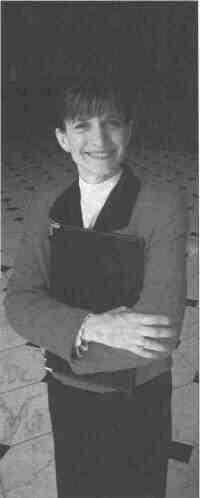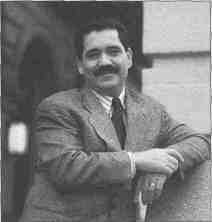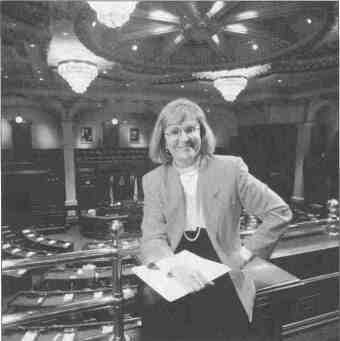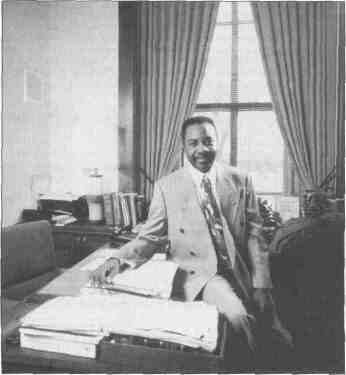 |
Home | Search | Browse | About IPO | Staff | Links |
 |
Home | Search | Browse | About IPO | Staff | Links |
to revolutionize state government. Now, they say, changing the world
may take longer than they thought
|
When they first were sworn in last year, there was a general feeling among the class of 53 brand-new lawmakers — nearly one-third of the entire legislature — that they could significantly affect the way the state is governed. Many of them now snicker at the memory. "All the freshmen came in with what we thought was a different focus: that voters were sick of the political infighting and that we were going to get in there and change the system," says a Republican rookie from Aurora, Rep. Patricia Reid Lindner. "I think we're all just realizing now we have to ask if we're going to be able to do something, period." Sen. Rickey Hendon, a freshman Democrat who represents part of Chicago's west side, agrees. "Last year we were like, 'We're gonna go in there and change the world,'" he recalls. "And then we found out it's more like, no, we're not; we're going to sit at our desks a couple of hours while the Four Tops [the legislative leaders] figure out what's going on." Indeed, it wasn't long before rookie lawmakers learned the power structure in Springfield puts most decision-making authority in the hands of each party's leaders in the House and Senate, long-time veterans of the legislature. And that was just the first of their lessons. Freshman Rep. Nancy Kaszak (D-34, Chicago) was dismayed to find an environment unfriendly to new ideas and fresh approaches. "People were really surprised I had gone out and talked to my constituents to come up with ideas for new laws," she says. "But a big part of why I'm here is to bring in their ideas." Rep. Pennie von Bergen Wessels, a Sterling Democrat, was amazed that partisanship cost her sponsorship of legislation beneficial to her constituents.
|

Photo by Terry Farmer State Rep. Nancy Kaszak
|
Sen. Steven Rauschenberger of Elgin says he and fellow freshmen Republican senators soon found they were expected to know their place."I think I've been treated with respect by the veterans," he says. "But there was a wariness on their part about whether we really understood our roles, and did we know what we were doing."
Now, as they move through their second year as lawmakers, freshmen look back on their first year as a learning experience. Foremost among the lessons:
• Most decisions are made, outside of their earshot, by very
12/May 1994/Illinois Issues

Photo by Terry Farmer State Sen. Jesus Garcia
|
few people. • Partisan fighting can be intense enough to torpedo worth-while ideas. • Many state policies are shaped by a small number of people who often use money and intimidation to advance their agendas. Mostly, they've learned that they can't revolutionize the way Illinois is governed. Yet despite these complaints, interviews with eight freshmen lawmakers — from both parties, in both houses, from different parts of the state — reveal the sense that they have achieved some influence on laws and policies. They have experienced enough success to make the frustrations tolerable — and to make them want to stick around. |
The tight grip that legislative leaders hold over their parties and chambers became obvious to freshmen almost immediately.
"The power of Pate Philip and Mike Madigan over the life and death of every single bill — it's just too much," says von Bergen Wessels, referring to the Senate president and House speaker. "When you have all these people elected by constituents, the power in those two people is dismaying."
One privilege that helps consolidate power for the leader of the majority party in each chamber is his ability to appoint all committee chairpersons. That may sound like an arcane, procedural duty to voters back home, but in reality it means a few people have the power to control which bills get a fair hearing, points out freshman Rauschenberger.
Von Bergen Wessels recalls sitting in one committee listening to discussion of a bill (later signed into law) giving large public utilities the right to bypass regulators and set up subsidiaries to compete for new business customers — a measure consumer watchdog groups feared would mean higher bills for residential customers. She was surprised to hear the committee chairwoman, a fellow Democrat, say each political party — not even each member — could ask only one question of people testifying on the bill.
"That's ridiculous," she says. "Of course we should be allowed to ask questions. If we're not here to learn about the things we're voting on, why are we here?"
Freshman Rep. Ann Hughes (R-63, Woodstock) has had to watch bills she sponsored to reform workers' compensation wallow in a House committee dominated by Democrats unfriendly to such efforts. They were never even called for a vote.
But there do seem to be ways to work around such hurdles, in part through patience and compromise.
|
Freshman Sen. Jesus Garcia (D-l, Chicago) got a taste of that last year when he arrived facing one of the most obvious barriers of any senator. Before Garcia's term began. Senate President Philip was widely quoted as supporting cuts in bilingual education programs. "Let 'em learn English" was Philip's suggested alternative. For Garcia, whose district is largely Hispanic, this signaled a problem. "I sensed there was a high level of intolerance for immigrants," he says. "I came down knowing the possibilities were limited for improving the state of bilingual education, and I represent a district where that's very important."
As it turns out, though, Garcia won passage of two bills he sponsored dealing with multilingual issues. One concerns student achievement tests for bilingual students; the other, which isn't as tough as he'd hoped, relates to interpreters in hospitals and nursing homes. "I felt we made progress informing and educating people about the goals of helping people learn to read English," Garcia says. "It gave me new hope we could continue to |

Photo by Terry Farmer State Sen. Steven Rauschenberger
|
Even von Bergen Wessels saw a trickle-down advantage to powerful leadership when Speaker Madigan helped her with an issue important to many of her constituents — a request for more than $730,000 in emergency funds to keep the Mount Morris school district in northwest Illinois operating.
She says Madigan went out of his way to make sure the loan went through, in part because Republicans are targeting her for defeat in November and the bill would make her look good back home. But Republicans didn't want her to look
May 1994/Illinois Issues/13
too good; in exchange for their support, Republican senators insisted that von Bergen Wessels' name be removed from the original bill in hopes of diminishing the aura of her success. "To the extent that you're a freshman target, and they want you reelected, it gives you a little bit of clout," she says. "But generally, decisions are made out of our hands, in meetings we are not privy to."
Freshmen lawmakers also received an unexpected primer on the power of special interest groups and lobbyists — power that may be old news to many in government, but caught several rookies off guard.
"I was told during freshman orientation that out of all the time I am in the legislature, I would probably think of only four bills on my own," says Kaszak. "The rest would be handed to me by special interests. Well, I thought, 'Oh my God...I can do better than that.'"

Photo by Terry Farmer State Rep. Judy Biggert
|
"It's a lot heavier than I had imagined," Hendon says of lobbying efforts. Watching groups like doctors and trial lawyers lobby in the Capitol makes clear the financial gains possible via legislation. "These groups have a lot of money and a lot of power to try to get things passed that they want — which the average citizen doesn't have," he says. "But it's not all bad. Sometimes the interest groups give a better analysis of bills than the Democratic or Republican staffs." Freshman Republican Rep. Judy Biggert (R-81, Hinsdale) says lobbyists have helped her digest details of legislative proposals she wouldn't have learned otherwise. "I had always heard of lobbyists as kind of the bad guys," she says. "But they are of great benefit — they have education and background on issues. Everybody expects us to be an expert on every subject, which is really not possible, so I appreciate someone coming in and explaining details to us." Adds Lindner of Aurora: "Special interest groups represent real people — Realtors, nurses, farmers. They're more well-versed on |
But there are definite drawbacks to the groups' power, say some. One of Kaszak's reservations about lobbyists' influence is that some lawmakers let these insiders set legislative agendas instead of turning to "real people" — the voters — to do so.
"The whole question of having bills handed to you really reflects a lack of willingness or interest or ability to have your own agenda," says the Chicago Democrat. "There are thousands of bills introduced each year, and many are generated by forces outside of the people in our districts. That bothers me because it means we tend to have replays of the same fights over and over: business vs. environment, labor vs. management.
"I think we need more new ideas," she says. "I think that's one reason I've been successful here. I went through a year-long process of talking to the people in my district to find out about what they need before I even came down here. I talked to the business owners, the employees. That helped me set up my own agenda."
She points to two of her efforts — one signed into law, one killed — to illustrate lobbyist influence and the importance of bringing fresh ideas from one's home to Springfield.
The first proposal was based on complaints from small- and medium-sized business owners in Kaszak's urban district who were having trouble understanding and gathering information on various regulations they must follow — from environmental laws to the Americans with Disabilities Act to the array of local permits needed. "Large businesses have platoons of lawyers and even scientists to deal with these things for them," she says. To aid those who don't, she helped pass legislation to create "one-stop shopping centers," where smaller businesses can get help navigating confusing bureaucracies. Since then, she's seen dozens of businesses take advantage of the service.
The other proposal was based on complaints that these same small business owners were having difficulty getting loans under $100,000. Bankers told her such loans often aren't worth the paperwork.
"No one's suggesting loans be made to people who aren't
14/May 1994/Illinois Issues
credit-worthy," Kaszak says. "Some people want a $15,000 loan to start a business but they don't have a house to put up as collateral. There may be ways we can help encourage these loans, but first I wanted to understand where this was happening." She introduced a bill that would have required certain financial institutions to disclose data on small business loans so she could see how severe the problem was and where it existed. "It met with bitter defeat because the banking lobby felt it was another requirement, although the individual bankers I had met with felt it would be useful information," she says.
"I thought it was a good idea because I had talked to real people who might have been able to start businesses and employ people if they could get these loans," she says. "But this is such an insiders' game. The lawmakers talk to the lobbyists, the lobbyists talk to the lawmakers, and it winds up being the same group of 500 people going around and around putting their opinions in and making the decisions. When I came in with my ideas, people were like, 'Hey, these are new ideas — who gave them to you?' Well, my constituents gave them to me. There is an advantage of talking to people from the outside."
One of the biggest surprises and frustrations to newcomers is the all-consuming attention paid to getting reelected. State representatives serve two-year terms, and senators rotate four- and two-year terms.
"It does a real disservice when you're trying to concentrate on legislation that you have to start campaigning right away," says Biggert of Hinsdale. "You never have time to read and think about the issues. When did I start campaigning? The day I was elected."
|
Kaszak agrees that the frequent campaigning shapes too much of what happens in the legislature, pointing out that members of the House are never more than 14 months away from reelection because primaries take place in March. "There's a lot of things wrong with the legislative system, but the biggest problem is the inordinate amount of attention focused on getting reelected," she says. "Constantly having to think about being reelected leads to short-term thinking. It leads to a tinkering mentality: Bills are introduced to lengthen things, shorten the time frame on things, expand categories, shrink categories, but have they solved any problems?"
She says too many lawmakers seem to introduce and vote on bills based on what they want to put on their campaign brochures. "I think most of the time they're working on bills so they can say to their constituents, 'I passed something on crime,' and 'I passed something on education,'" she says. Lawmakers also are reminded frequently of what can show up on opponents' campaign brochures. For instance, there was a proposal last year to authorize school districts to issue bonds to pay for alternate fire escapes so disabled students could escape |

Photo by Terry Farmer State Sen. Rickey Hendon
|
An even more vexing problem involves figuring out how to pay for campaigns, which can run into hundreds of thousands of dollars.
"I continue to have a deep concern about how much money is spent on elections," says Garcia of Chicago. "It goes back to the influence of interest groups. Many of those groups continue to exert a lot more power and pressure than the average citizen because they can donate money to a politician and help him or her win an election. I would say that's not good for government or politics. I continue to think public financing of campaigns is still the best way to ensure the common folk are heard."
Like many others, von Bergen Wessels of Sterling agrees there's a need for changes in campaign financing. "I think there'd be a lot more willingness to take tough votes on things
15/May 1994/Illinois Issues
if people are less likely to think of the financial impact" on their campaign accounts, she says. For instance, a business group lobbyist approached her last year and threatened to use an upcoming vote against her during her next election if she didn't vote the group's position. She says she still voted her conscience on the matter, but the incident made her wonder how many others are swayed by such threats — and by the knowledge that votes can be turned into needed campaign contributions.
Von Bergen Wessels ran unsuccessfully for the state Senate in 1988 on a low-budget campaign with no funds donated by special interest groups or legislative leaders' accounts. "I always wanted to believe I could do it on shoe leather," she says. "But you can't. I knocked on 10,000 doors back then. I learned the hard way that you need that money."
Several freshmen of both parties see longer terms as a solution to the reelection trap, possibly tied to term limits.
"One of my weaknesses is that I tend to look at issues and votes based on my philosophies on good government and look at political outcomes later," says Hughes of Woodstock. "If I were redesigning the system, I'd have four-year terms for representatives and six-year terms for senators — for both Congress and the Statehouse. I think that way there wouldn't be such a need to tie votes to politics."
But Kaszak contends the problems are worse at the federal level, where senators already serve six-year terms. "I think it's a matter of starting to make things better at the point closest to the voters," she says. "For now that's the only place we even have a chance with."
"The terms are way too short, particularly since I've had to spend the last three months dealing with the primary," says Lindner of Aurora. "Unfortunately, I'm always thinking about being reelected."
Sounds like a job that's more hassle than fun. Why would these freshmen even want to be reelected? Well, says Rauschenberger, the fulfillment comes during moments of compromise between parties and geographic areas and recognition that one's own ideas have become part of a larger picture.
For Kaszak of Chicago, one of those moments was achieved when she worked with Republican colleague Biggert on a law directing the state to provide aid and advice to communities for job training and industry retention. For Rep. Hughes, such a moment came while working with Democrat Rep. Art Turner of Chicago on another new law to reduce restrictions on businesses. It allows employers to refrain from paying employees overtime for up to 10 hours if that time is used to teach the employee reading or other basic academic skills.
For Sen. Rauschenberger, it came when Gov. Edgar incorporated important elements of his pension-funding plan into the 1994-95 budget proposal.
"You can see where new ideas [affect] the system," says the Elgin Republican. "The question is, can we keep the freshness?"
These aren't the type of big-ticket measures like riverboat casinos or assault weapon bans that catch everyone's attention. But, say rookie lawmakers, they could end up making a difference in the lives of "real people."
It's important, Rauschenberger says, to remember that a lawmaker's job is to steer, not revolutionize, government.
"We expected people to instantly recognize the brilliance of our ideas," he says. "Once you get the bone passed through your throat that you don't make the agenda and you don't set the budget, that's when you can start to be effective. For me, that happened once I got past the frustration of seeing I wasn't knighted to change state government."
Realizations like these helped all the freshmen understand they weren't going to change the world — much less Illinois government. But by focusing on more narrow, achievable goals, they feel they're starting to have some small impact. And if that's what they can get, they say, it's better than starting with nothing.
16/May 1994/Illinois Issues
|
|